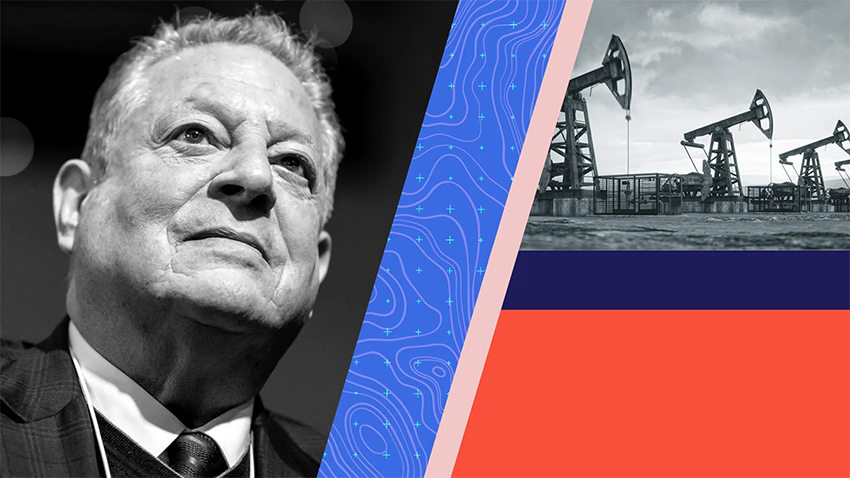|

14 September2023
By
Andrew Freedman
Al Gore: "Mistake" to think big oil,
gas are part of a climate solution

Photo illustration: Sarah Grillo/Axios. Photo:
Fabrice Coffrini/AFP via Getty images
Al Gore has a mix of optimism and hope at the pace
of decarbonization but seethes with
frustration over the players he thinks are blocking faster progress.
The big picture: In a wide-ranging
interview with Axios, the former Vice President and longtime
environmental advocate discussed his investment firm's latest
insights on the state of the world's
transition to a low emissions economy.
-
He also detailed his increasingly
confrontational stance toward the fossil fuel industry.
-
Gore said there are increasing signs
of a tipping point for clean energy, but the necessary ingredients
are not there yet.
Zoom in: "The crisis is still getting
worse faster than we're deploying the solutions. But the new momentum
that is being built up is continuing to increase. And there's reason
for believing that soon we will be able to gain on the crisis itself,"
he said optimistically.
-
But there were also flashes of the
fiery, call-it-like-you-see it, clear-eyed side to Gore, which he
displayed during his July TED
talk. On that occasion, Gore sharply
shifted his public stance toward the oil and gas industry.
-
He denounced as-yet unproven technologies at
scale (like direct
air capture) designed to
address greenhouse gas emissions, potentially without rapid
transition to cleaner energy sources.
Between the lines: The fossil fuel
industry plans
to continue to rely on fossil fuels as its
core business, Gore argued. He blasted their talk of becoming more
diverse energy players, or moving beyond their oil and gas divisions,
as mere greenwashing and
distraction.
-
Meanwhile, these companies continue to
hold political sway, creating policy roadblocks, Gore said.
Despite the increasingly clear effects of
climate change, "the fossil fuel industry still has a degree of
control over the conservative movement, the Republican Party, their
allies in various sectors. And I have to believe that that's going to,
to begin to fade," Gore said.
-
"We're not far away from a genuine
political tipping point."
The intrigue: Gore hasn't shied away
from criticizing the oil and gas industry. He criticized the selection
of Sultan Ahmed al-Jaber as the
president-designate of the upcoming climate summit in Dubai.
-
Al-Jaber heads the United Arab
Emirates' national oil company, ADNOC, as well as the country's
renewables efforts.
-
Gore sees al-Jaber's appointment as a sign that
industry has captured the U.N. climate diplomacy process.
-
He didn't say whether he would attend COP28 but
does support a push to change the voting rules so that no one
country can have veto power over all others.
-
Saudi Arabia and other
oil-producing countries have frustrated efforts during recent
climate summits in Scotland and Egypt to agree on language calling
for a fossil fuel phaseout.
What they're saying: The UAE
COP28 leadership argues that inviting all
parties to the talks, including oil and gas firms, is a move toward
getting meaningful proposals from all players.
-
To that end, Gore suggested that
fossil fuel companies commit to putting money toward a $75 billion
fund, "which would represent less than one-half of 1% of their
profits expected from now through 2030" to squelch the biggest
methane emissions sources, such as abandoned wells.
-
Methane is a powerful
planet-warming gas.
Yes, but: Gore sees fossil fuel
companies as locked into their current business models.
-
"It has probably never been realistic
to expect the fossil fuel industry to play a genuinely meaningful
role in helping us decarbonize society," Gore told Axios.
-
"No matter what they have said, no
matter what thoughtful men and women in the industry know is
ultimately the right thing to do, they are powerfully incentivized
by their shareholders to continue" drilling for oil and gas, thereby
adding to human-caused global warming, he said.
-
"Their culture, their skills,
their network, all drive them in that same direction. The bankers
that finance them are making handsome profits from it," he said.
On Tuesday, Bernard Looney abruptly
resigned as CEO of BP. Asked for his
(hypothetical) advice to Looney's successor, Gore responded: "Well, I
would say...stop trying to portray your policies as climate friendly
when they're clearly not."
-
"I would certainly welcome a positive
surprise from any of them. I would welcome a positive surprise from
the president of COP28. I would welcome a surprise from OPEC and the
petro states," he said. "I don't expect one."
In a statement provided to Axios,
COP28's leadership said that "tackling the climate crisis requires
unity and collective action. COP28 is focusing on keeping 1.5C within
reach and delivering our action agenda. We must fast track a just and
orderly energy transition, fix climate finance, and focus on lives and
livelihoods."
-
"At the same time, we are committed to
hosting the most inclusive COP to-date. We must all together, focus
on bringing solutions to the table and deliver a successful COP28
for all," the statement added.
The bottom line: What animates Gore is a
perceived disconnect between how fossil fuel companies portray
themselves on climate, and what they're actually doing.
-
"They have had an incentive to portray
themselves as the the prime source of the advice we need to solve
this crisis. And they have apparently, parlayed that perception into
a series of strategies to delay and block action," Gore said.
-
"It's not fair to ask them to
do it if they're not capable of doing it. But it is fair to ask them
to stop the blocking of everyone else's efforts to solve the
crisis," Gore said. "If you can't help and if you won't help, get
out of the way!"
More from Axios:
Green Play Ammonia™, Yielder® NFuel Energy.
Spokane, Washington. 99212
509 995 1879
Cell, Pacific Time Zone.
General office:
509-254
6854
4501 East Trent
Ave.
Spokane, WA 99212
|